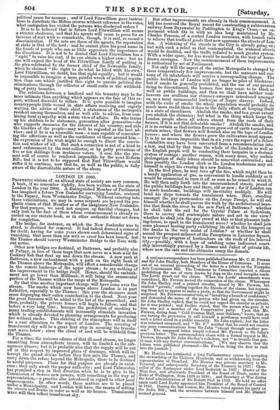A curious correspondence has been published between Mr. C. H.
Frewen and Sir John Shelley, both Members of the House of Commons. It arose out of an unusual proceeding of the latter in a debate on the Turnpike Acts Continuance Bill. The Commons in Committee inserted a clause prohibiting the use of carts drawn by dogs on the rural turnpike roads. The Lords struck out the clause. When the Lords' amendments were considered, Mr. Frewen moved the reinsertion of the clause. Whereupon Sir John Shelley read a printed circular, issued by Mr. Frewen, but marked "private," calling together the friends of the clause, but request- ing them not to appear to make a party, so that the Government might be surprised. Mr. Frewen resented this, as "involving a breach of confidence " and demanded the name of the person who had given up the circular. Sir John Shelley replied, that he could not regard the circular as private, for it was printed ; and further stated, that the person who gave it to him was not a member of the Conservative party. Upon this Mr. Frewen, dating from" Cold Overton Hall, near Oakham," wrote, that no one having the pretension to call himself a gentleman would have read such a letter aloud in a public assembly. Sir John replied ; but the letter was returned unopened, and "Mr. F.' notified that he could not receive any more communications from Sir John "except through another per- son." The unopened letter simply referred Mr. Frewen to Sir John's previous letter. The correspondence closes with a formal request to Mr. Frewen, through Sir John Shelley's solicitors, not "to trouble that gen- tleman with any further communications." [We may observe that the letters were published piecemeal—Mr. Frewen being the first to rush into the journals.] Mr. Marries has terminated a long Parliamentary career by accepting the stewardship of the Chiltern Hundreds, and so withdrawing from the representation of Stamford. Mr. Harries was private secretary to Mr. Perceval, and subsequently Secretary of the Treasury in 1822; Chan- cellor of the Exchequer under Lord Goderich in 1827; Master of the Mint first, and afterwards President of the Board of Trade under the Duke of Wellington, from 1828 to 1830; and Secretary at War during the brief administration of Sir Robert Peel in 1836. He held no office again until Lord Darby appointed him President of the Board of Control in 1852. During the last session, Mr. Herries voted against his party OA the India Bill ; and the severance between himself and Mr. Disraeli seemed general.


























 Previous page
Previous page